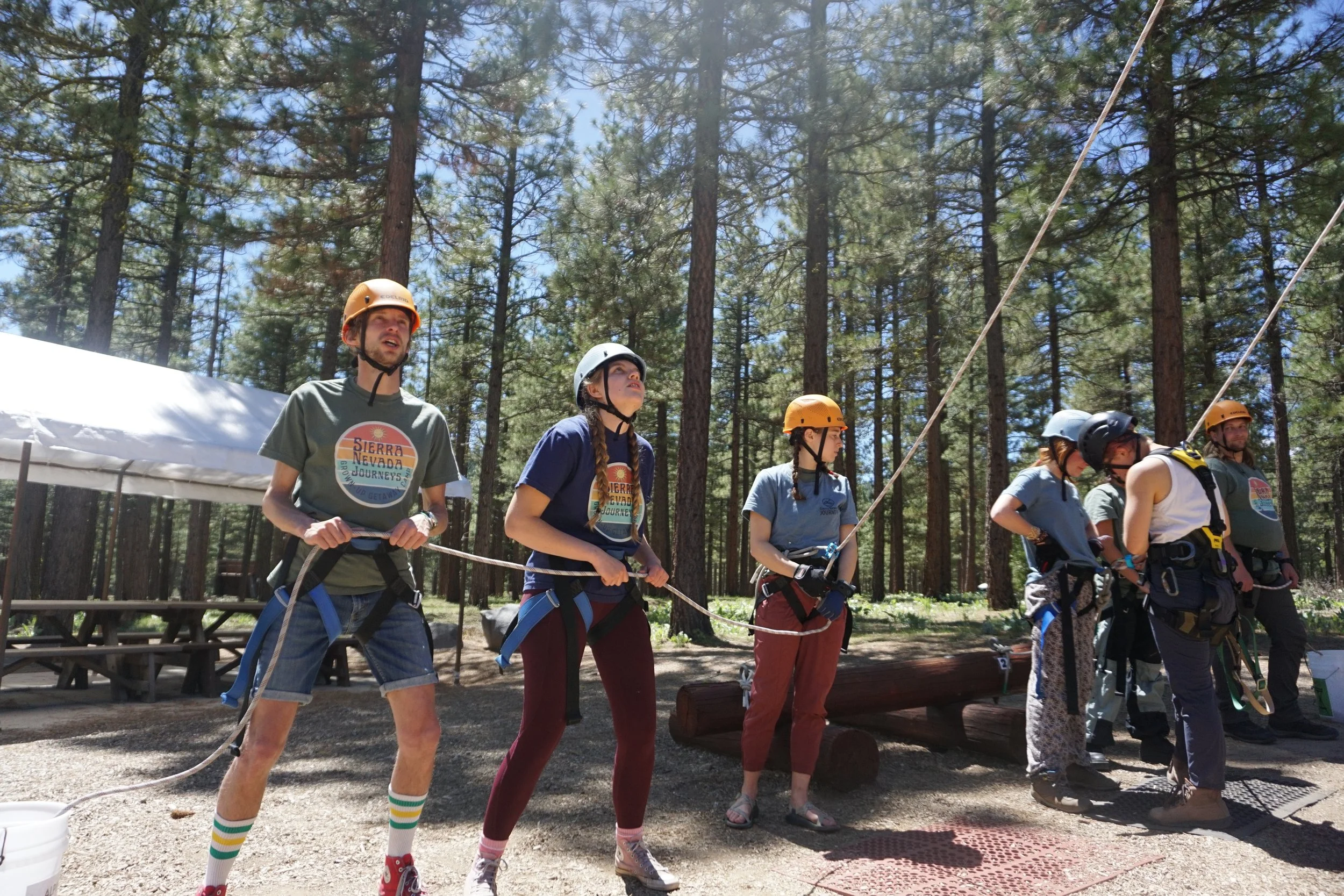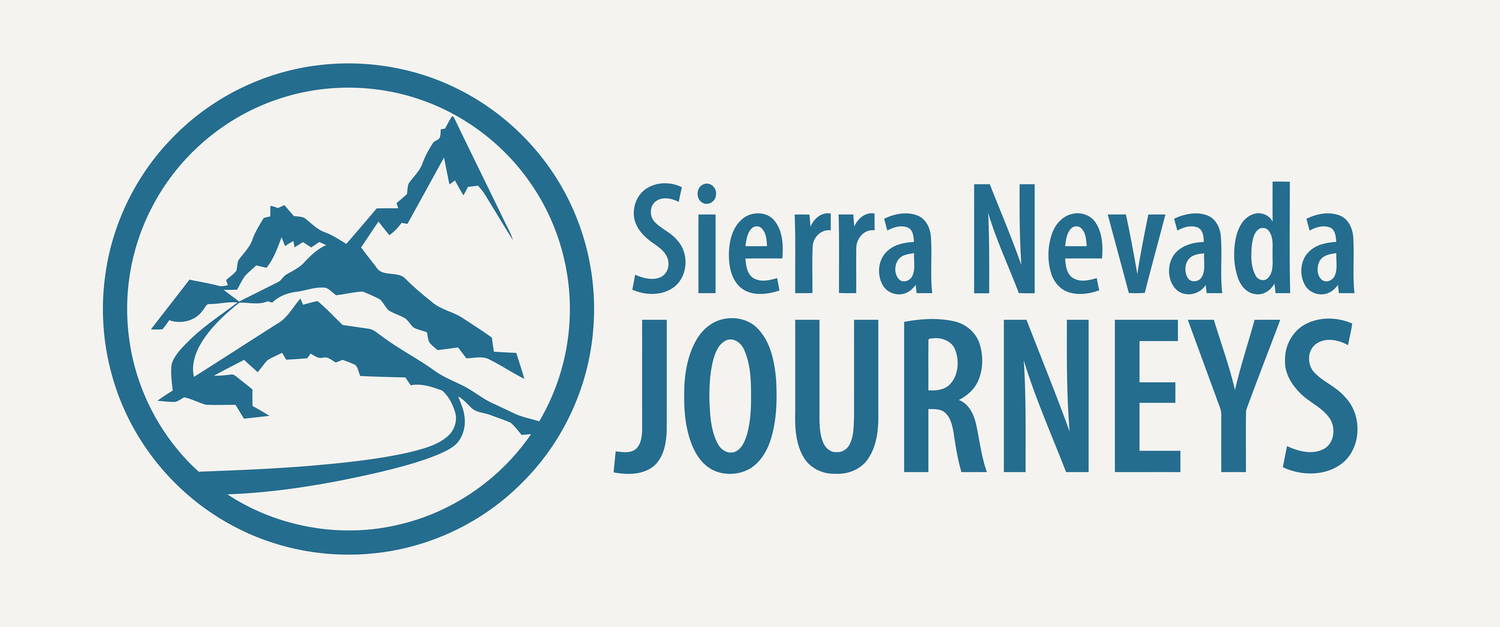
Outdoor Program Instructors
Frequently Asked Questions
Q: Where do I live?
We have staff houses off-site, exclusively for our Outdoor Program Instructors. Houses are about a 5-minute drive from camp in Portola, California. Some staff do not have cars; the houses are an easy bike ride from camp. Please note that at the beginning of your term living in off-site housing, a $100 damage deposit is required; it will be returned to you at the end of employment if no damage is caused.
Q: What will I be teaching (what groups will I be working with)?
During the spring and fall, your time will be spent teaching our Overnight Outdoor Learning curriculum to fifth and sixth-graders from the Reno, Tahoe, and Sacramento areas. Our engaging lessons are built using Next Generation Science Standards (NGSS) and Common Core Standards. Topics include hands-on exploration of resource conservation, local ecology and biology, energy transfer, and engineering principles.
During the summer, your time will be spent delivering curriculum to our summer campers and community groups. Community programming often focuses on leadership development on our challenge course. Summer camp programming includes swimming, ropes course, sports, archery, and campfires.
The challenge course is a very popular program area for our campus and instructors spend 2-3 days per week facilitating the course. Many school groups and community groups request the challenge course to promote collaborative problem-solving and critical thinking through the experience.
Q: What type of training will I receive?
Instructors receive two weeks of training in the spring. One week is dedicated to the challenge course, the other is dedicated to the Overnight Outdoor Learning curriculum, teaching tips, behavior management techniques, and risk management. You will receive additional training related to summer camp programming and other topics throughout the year, which include:
1. Lifeguarding
2. Adaptive programming training for people with disabilities
3. Diversity, social justice, and restorative justice training
4. Training to incorporate teen leadership into the ropes course
5. Training to lead summer program areas such as archery and kayaking
Q: What do people do in their free time?
Sierra Nevada Journeys’ Environmental Education Camp is perfectly situated for outdoor recreation. Nearby, there are Lakes Basin Recreation Area, Bucks Lake, and Lake Davis. Lake Tahoe is about one hour away. All areas offer outdoor recreation opportunities like climbing, hiking, skiing, kayaking, and fishing. Additionally, Reno is 50 miles away. Many staff routinely visit Reno to stock up on personal supplies, go out to dinner, catch a movie or concert.
Q: How many instructors are there?
There are 12-14 Outdoor Program Instructors.
Q: Who else works at camp?
There are Lead Outdoor Program Instructors (LOPIs). The LOPIs coordinate the groups and act as instructors when needed. The Program Director supervises the LOPIs and the OPIs, as well as the overall program quality and implementation. The Program Director also directs, evaluates, and updates all campus programming. The Adventure Manager rounds out the program leadership team. Additionally, there are Program Logistic Coordinators and a Program Manager who coordinates programming with the incoming schools and partners. The Chief Operating Officer oversees Camp, and there are maintenance, kitchen, and housekeeping crews that provide our fantastic food and help keep the camp looking spectacular.
View the virtual tour for more information about our camp.
Q: What is the food like?
Instructors are welcome to eat meals at camp any time they are being served. Our food is both kid- and adult-friendly. We always provide a hot and cold option for each meal and regularly accommodate dietary restrictions and food allergies for both staff and participants. We value our very strong reputation with visitors for serving great-tasting, healthy meals.
Q: Will I be staying in a cabin with the students or campers?
During the summer, you will have the option to spend a couple of weeks staying with the campers and leading activities for our teen leadership programs. During the spring and fall seasons, schools and community groups are required to bring parent chaperones to stay with the youth in the cabins.
Q: What will my work schedule look like?
The daily work schedule varies with each group. With Overnight Outdoor Learning groups, the day begins at 7:45 a.m. with breakfast and ends at 9 p.m. with the evening program. Instructors are scheduled on a rotating basis for meals and evening programs. If not working breakfast, instructors arrive for a staff meeting at 9 a.m. If not working dinner or an evening program, instructors leave at around 5:30 p.m. The number of meals and evening programs worked each week varies on group size. An instructor may work anywhere from 1-4 evening programs in a week. Hours vary when working with other community groups. Our camp is operational seven days a week and your days off will vary. Some weekend work is required, and instructors work an average of five days per week over the course of employment.
Q: What professional development opportunities are available?
Create and manage your challenge course portfolio
Lead training segments during summer and fall training periods
Develop and execute interest-based projects (such as developing curricula or creating program materials)
Work with diverse groups and populations (campers from low-income communities, students of color, people with disabilities, leadership development, students, campers, teachers, and adults)
Waterfront lifeguard certification
Deep resume experience teaching elementary and middle school STEM subjects with a well-known, high-quality education provider
Sierra Nevada Journeys is committed to providing meaningful professional development opportunities for our instructors. In prior years, we have sent Residential Outdoor Program Instructors to Next Generation Science Standards (NGSS) trainings or the AEOE Conference. Each year’s opportunities vary with timing, location, and applicability.
